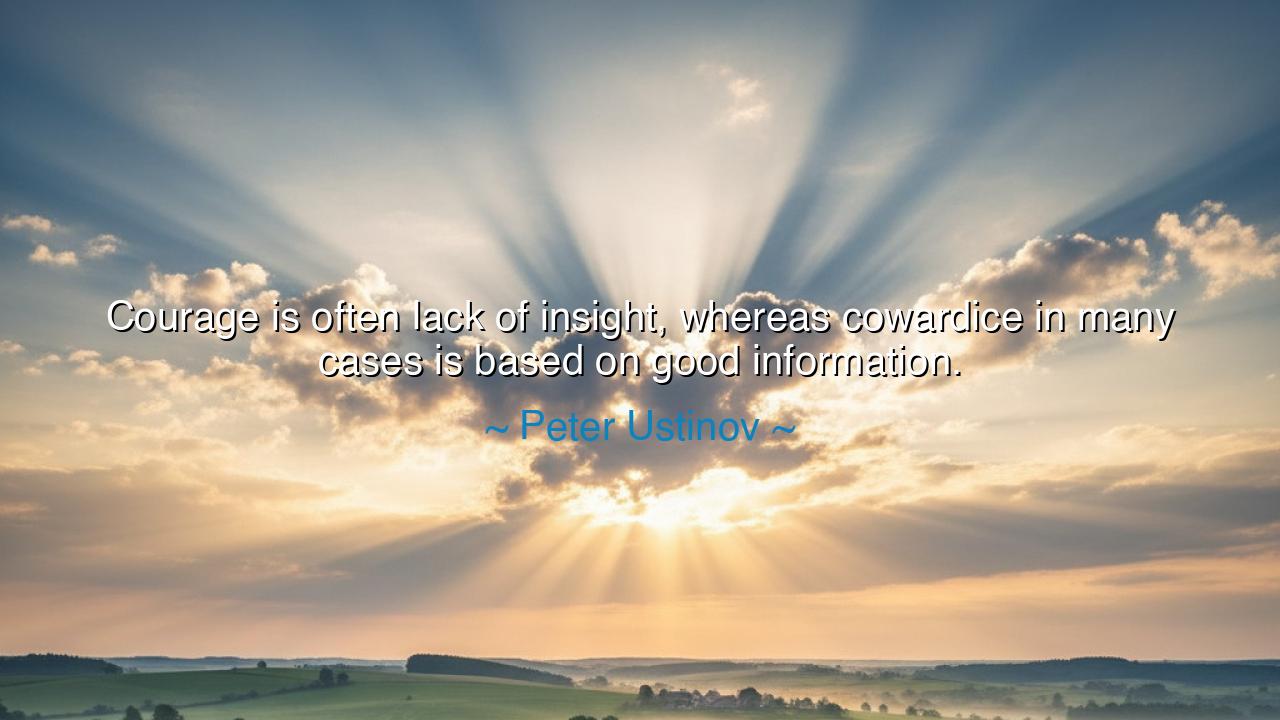
Courage is often lack of insight, whereas cowardice in many cases
Courage is often lack of insight, whereas cowardice in many cases is based on good information.






In the twilight of reflection, the great actor and wit Peter Ustinov uttered words that shimmer with paradox and truth: “Courage is often lack of insight, whereas cowardice in many cases is based on good information.” These words, though wrapped in humor, carry the weight of deep wisdom. They reveal a truth about the strange and unpredictable nature of human bravery — that what we call courage and what we call cowardice are not always born from virtue or vice, but from the limits of what we know. Ustinov, who saw much of the folly and heroism of humankind through the lens of art and history, reminds us that courage is not always wise, and fear is not always foolish.
Courage, in its purest form, has long been celebrated — the cry of the warrior on the battlefield, the stand of the martyr before tyranny, the leap of the explorer into the unknown. Yet Ustinov suggests that often, those who act bravely do so not because they have weighed the risks, but because they do not fully comprehend them. The man who rushes into the flames may not know their heat; the soldier who charges may not yet have seen death’s face. It is sometimes the lack of insight — the inability to perceive the full danger — that gives rise to deeds others call heroic. In this way, courage may spring not from strength alone, but from innocence, blindness, or a heart too simple to calculate its peril.
On the other hand, cowardice — that despised word — may in truth be the fruit of knowledge. The one who hesitates before the abyss may do so not because he lacks will, but because he understands too well what lies beneath. The ancient generals knew this: that the seasoned soldier trembles more than the young recruit, for he has seen what war truly costs. So too in life — those who have suffered deeply may be slow to leap again, not from weakness, but from wisdom. Ustinov’s irony teaches us compassion: before judging the fearful, we must remember that fear may be born not from frailty, but from understanding.
Consider the tale of Hector of Troy, the noble prince who faced Achilles. His courage was great, but so too was his awareness. He knew he would die, yet he chose to stand and fight for honor and for love of his city. Was his act one of ignorance or insight? Perhaps it was both. For he understood death, but refused to let that knowledge bind him. True courage, then, lies somewhere between these two extremes — neither blind recklessness nor paralyzing foresight, but the sacred balance between awareness and will.
Ustinov’s words also warn us against the illusions of pride. Many who act rashly call themselves brave, when in truth they are merely unaware. And many who are cautious condemn themselves as cowards, when in truth they are wise. The ancients would call this the difference between foolhardiness and prudence. The fool mistakes recklessness for valor; the wise man knows that to live another day may sometimes be the greater act of courage. There is honor not only in charging forward, but also in stepping back when the moment demands it.
This paradox — that insight can breed fear, and ignorance can breed boldness — is the eternal dance of the human spirit. The challenge, then, is to seek the middle way: to see clearly and still choose to act. For if we act without knowing, we risk destruction; but if we know and never act, we risk stagnation. Courage without wisdom burns itself out; wisdom without courage withers into despair. The great souls of history — from Socrates to Gandhi, from Joan of Arc to Nelson Mandela — found harmony between the two. They saw the danger, yet they rose above it, not because they were blind, but because they were free.
So let this be the lesson, my children of thought: Do not glorify ignorance as bravery, nor mistake wisdom for cowardice. Seek knowledge, but let it strengthen your resolve, not your fear. When you face the storms of life, do not rush in blindly, nor flee in terror. Stand firm, with eyes open and heart steady. For true courage is not the absence of fear, nor the absence of understanding — it is the decision to act rightly, even when both fear and knowledge walk beside you.
Thus, Peter Ustinov’s words are not a jest but a mirror: they remind us that both courage and cowardice are born of the same human soul — one moved by ignorance, the other by insight. Our task is to unite the two, to see clearly yet still dare greatly. In this balance lies the wisdom of the ancients, the heart of every hero, and the quiet triumph of all who live with both awareness and boldness in their spirit.






AAdministratorAdministrator
Welcome, honored guests. Please leave a comment, we will respond soon